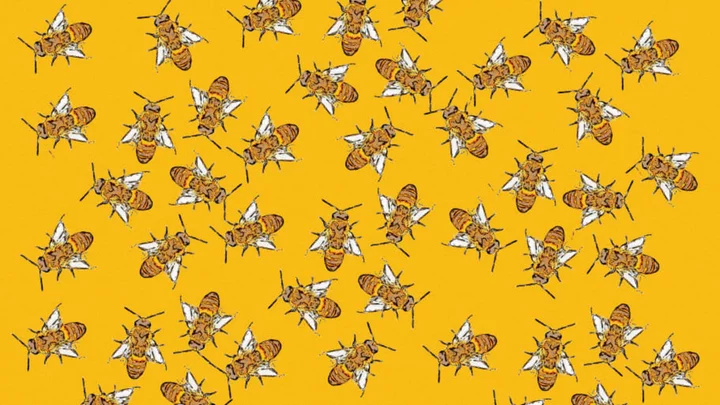We’re all familiar with the feeling of having an idea or subject stuck in your head that makes it difficult to think about anything else. But why (and when) did we start comparing that experience to a bee buzzing around in your hat?
According to most sources, the origin of the phrase bee in your bonnet can be traced back a few centuries, long before They Might Be Giants put a fine point on it in their catchy 1990 hit Birdhouse In Your Soul. And originally, bonnets had nothing to do with it.
One of the earliest examples of a similar bee-based phrase can be found in Scottish poet and clergyman Gavin Douglas’s 1513 translation of Virgil’s epic Aeneid into Scottish verse, in which he writes, “Quhat bern be thou in bed, with hed full of beys.” The sentence roughly translates to “What, man, rot thou in bed with thy head full of bees,” and alludes to a Scottish idiom about having a “head full of bees,” which the Oxford English Dictionary defines as “having a fantasy, an eccentric whim, a craze on some point, [or] a ‘screw loose.’” The association of madness with having bees in your head stuck around—Scottish satirist Samuel Colville wrote in his 17th-century satire The Scots Hudibras, “But bishops say such thoughts delude, which comes from brains which have a bee.”
It’s likely that bee in your bonnet evolved from that Scottish idiom to its more modern interpretation: That of having such a singular focus on a particular idea, seemingly to the point of obsession. The Reverend John Barker certainly gave the Scots credit when he offered one of the earliest recorded examples of the more familiar phrase in a 1738 letter to the Reverend Philip Doddridge: “He has, as the Scotch call it, a Bee in his Bonnet."
It’s perhaps not as strange as it might seem that bees made the jump from brains to bonnets. Not only were the hats worn by both men and women in Scotland at the time, but beekeepers, who initially wore wicker masks for protection, began donning the now-standard beekeeping veil in the 1600s. Given the ubiquity of beekeeping as a practice in rural Scottish and English communities during that period, dealing with a bee caught in your headwear—or anywhere else in your wardrobe, for that matter—would likely be just the sort of common experience to inspire an idiom (and probably a few other choice words).
That the phrase has endured as long as it has, despite shrinking numbers of both bonnets and (sadly) bees, might be the most surprising aspect of its history, though: Bee in your bonnet popped up in the script for 2002’s Harry Potter and the Chamber of Secrets (in reference to the titular boy wizard’s obsession with a particular mystery), for example, and served as the title of a 2022 episode of popular Netflix series Bridgerton.
And like many idioms, the idea of having a bee in your bonnet has evolved over the years to encompass alternative uses, too. Giving someone an idea they become obsessed with is putting a bee in their bonnet (an October 2006 letter published in Minnesota’s Bemidji Pioneer asked readers to “Put a bee in the bonnet of candidates on timber jobs”), while someone who has trouble moving off a particular subject is encouraged to get the bee out of their bonnet (“If the Sussexes really want their other ventures to take off they need to get the bee out of their bonnet first,” wrote Arjun Seth in a March 2023 op-ed for Palatinate, a student newspaper).
With roots likely tracing back more than 500 years, the notion of comparing a bee in your bonnet to sticky ideas doesn’t seem to be disappearing any time soon. Here’s hoping the same can be said for bees, too. And if you ever find yourself with a very literal bee in your bonnet—or other part of your wardrobe—don’t panic. If you can keep your mind calm and extricate the bee, there’s a good chance of avoiding the sort of sting you’ll be thinking about for a while.
Are you a logophile? Do you want to learn unusual words and old-timey slang to make conversation more interesting, or discover fascinating tidbits about the origins of everyday phrases? Then get our new book, The Curious Compendium of Wonderful Words: A Miscellany of Obscure Terms, Bizarre Phrases, & Surprising Etymologies, out now! You can pick up your copy on Amazon, Barnes & Noble, Books-A-Million, or Bookshop.org.
This article was originally published on www.mentalfloss.com as The Origins of the Phrase ‘Bee in Your Bonnet’.









